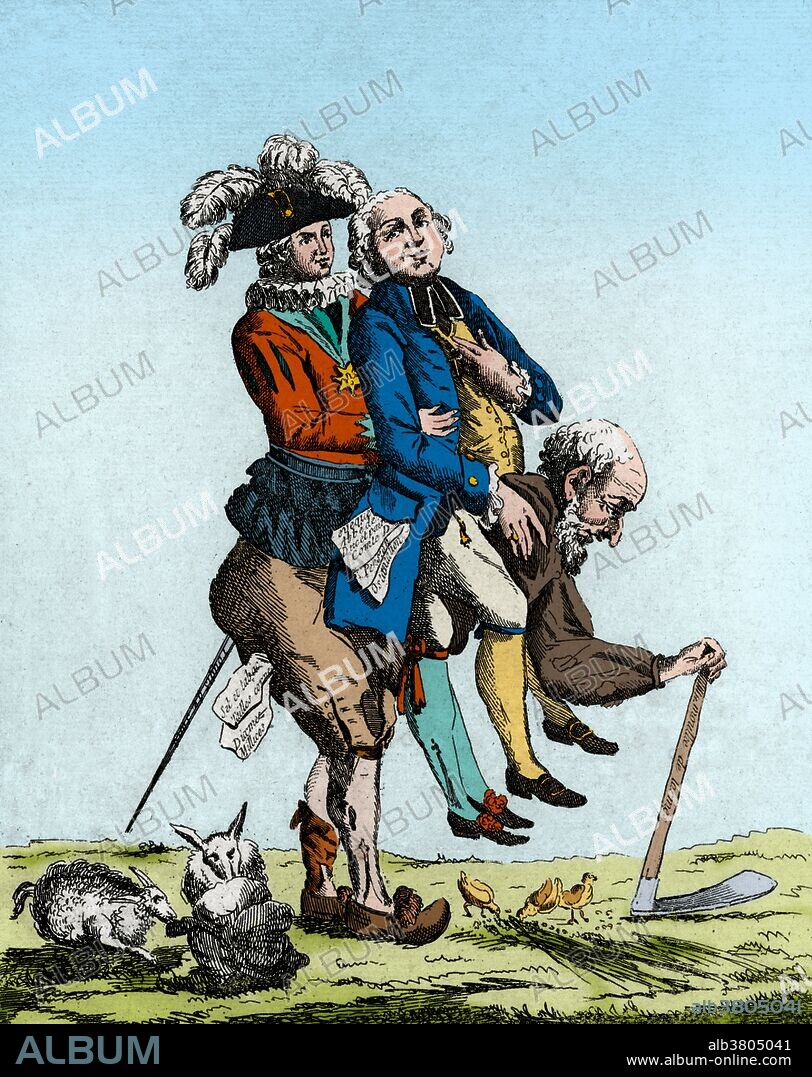alb3805041
French Revolution, Estates-General of 1789

|
Añadir a otro lightbox |
|
Añadir a otro lightbox |



¿Ya tienes cuenta? Iniciar sesión
¿No tienes cuenta? Regístrate
Compra esta imagen.
Selecciona el uso:

Título:
French Revolution, Estates-General of 1789
Descripción:
Traducción automática: Titulado: "A faut esperer q'eu se jeu la finira bentot". Muestra a la nobleza y al clero, que representan a los estados generales, montados a lomos de un hombre que representa a la clase trabajadora, o tercer estado; el hombre está encorvado bajo su peso y se sostiene apoyándose en una herramienta parecida a una azuela, mientras que a sus pies pájaros y conejos se dan un festín con el producto de su trabajo. Los Estados Generales de 1789 fueron la primera reunión desde 1614 de los Estados Generales franceses, una asamblea general que representaba a los estados franceses del reino: el clero (Primer Estado), los nobles (Segundo Estado) y el pueblo llano (Tercer Estado). Convocados por el rey Luis XVI para proponer soluciones a los problemas financieros de su gobierno, los Estados Generales se reunieron durante varias semanas en mayo y junio de 1789, pero llegaron a un punto muerto en el primer punto del orden del día: si debían votar por estamentos, dando ventaja a los dos primeros, que era la elección del rey, o votar todos juntos, dando ventaja al Tercer Estado. La votación se disolvió cuando el Tercer Estado se constituyó en Asamblea Nacional, invitando a los otros dos a unirse, contra los deseos del rey, lo que marcó el estallido de la Revolución Francesa. Sin autor acreditado, fechado en 1789. Esta imagen ha sido mejorada con color.
Entitled: "A faut esperer q'eu se jeu la finira bentot." Shows the nobility and the clergy, representing the estates general, riding on the back of a man representing the working class, or third estate; the man is bent under their weight and supports himself by leaning on an adz-like tool, while around his feet birds and rabbits feast on the produce of his labor. The Estates-General of 1789 was the first meeting since 1614 of the French Estates-General, a general assembly representing the French estates of the realm: the clergy (First Estate), the nobles (Second Estate), and the common people (Third Estate). Summoned by King Louis XVI to propose solutions to his government's financial problems, the Estates-General sat for several weeks in May and June 1789 but came to an impasse over the first item on the agenda: whether they should vote by estate, giving the first two estates an advantage, which was the king's choice, or vote all together, giving the Third Estate the advantage. It was brought to an end when the Third Estate formed into a National Assembly, inviting the other two to join, against the wishes of the king, signaling the outbreak of the French Revolution. No artist credited, dated 1789. This image has been color enhanced.
Crédito:
Album / Science Source
Autorizaciones:
Modelo: No - Propiedad: No
¿Preguntas relacionadas con los derechos?
¿Preguntas relacionadas con los derechos?
Tamaño imagen:
3331 x 4200 px | 40.0 MB
Tamaño impresión:
28.2 x 35.6 cm | 11.1 x 14.0 in (300 dpi)
Palabras clave:
ACONTECIMIENTO • ALEGORIA • ALEGORICA • ALEGORICO • ALLEGORICAL • ARTE • ASAMBLEA GENERAL • CLASE OBRERA • CLASE TRABAJADORA • COLOR • COLOREADA • DIBUJO • FAMOSA • FAMOSO • GOBIERNO • GRABADO • HISTORIA • HISTORICO • HOMBRES • ILUSTRACION • IMPORTANTE • NOBLEZA • OBRA DE ARTE • PLEBEYO • POLITICA • POLITICO • REVOLUCION FRANCESA • REVOLUCIÓN • S. XVIII • SIGLO XVIII
 Pinterest
Pinterest Twitter
Twitter Facebook
Facebook Copiar enlace
Copiar enlace Email
Email
